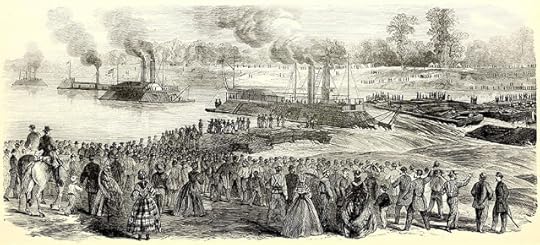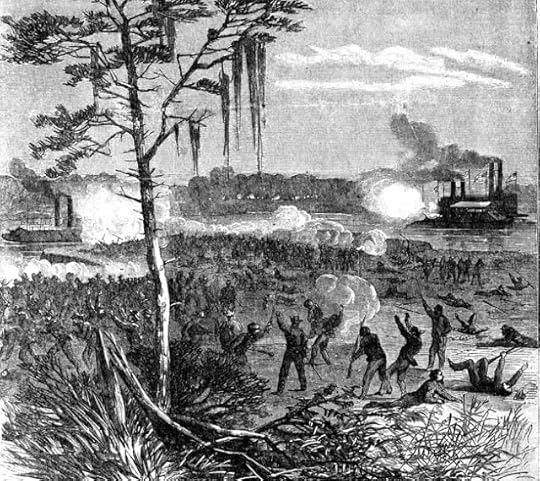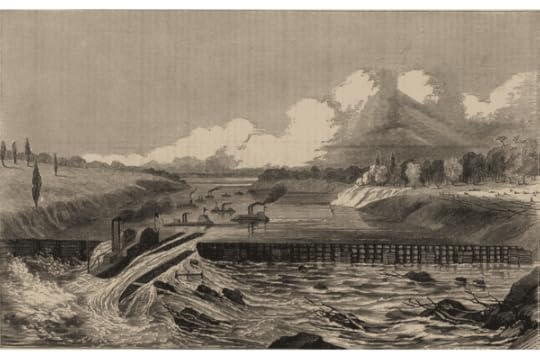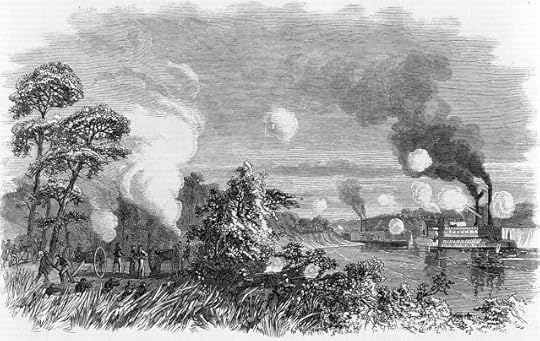Crashed Over the Dam as the Bands Played On: Escaping Red River Aboard the Mound City
By the time the gunboat U.S.S. Mound City made it down the Red River in May 1864, the ironclad had to dump much of its armor and 13 guns to get through the low waters. Reading the following letters from Engineer John Harnett, his determination and simple faith in success come through strongly, as well as a sense of the surreal.
A prime example is his description of how the Mound City got over the falls of the river at Bailey's Dam. "The fall was eight feet; the break just large enough for the boats to pass through," he said. "As ours was the first boat over the falls, we were the first ordered over the dam. We went out into the stream and got a good start and headed all right, put 150 lbs of steam to her, and down she went, burying herself completely and striking the rocky bottom with such great violence that she immediately stopped. Our rudder unshipped and the water roared over us in a perfect torrent. Had we not taken the precaution to close and batten all our ports and hatches, we would have been filled with water."
"After surging a minute or two, the current carried us down all right but we are strained very badly. It was a tremendous undertaking, however, we all got over safe except the Eastport. We also lost 13 guns which are exploded and our iron plating. I feel very sorry to lose the iron but I think we will be able to stand a good fight yet. I should mention that the dam was built of coal barges and log cribs filled and sunk with brick. Brass bands were playing on each side of the river as we passed over and tens of thousands of soldiers gave us cheer after cheer as we made the plunge," he wrote.
The Waukegan Weekly Gazette presented Engineer Harnett's letters thus: “We havebeen furnished the following letters from Mr. John M. Hartnett, U.S.N., writtento his wife during and succeeding the period when Admiral Porter’s naval fleetwas detained upon the Red River by low water,” the editor of the WaukeganWeekly Gazette stated in the introduction to this article. “Some of theletters bear rather remote dates, still they are very interesting, giving aclear account of the trials of our army and navy during that memorable periodand although somewhat old, will repay a perusal.”
“The Banks expedition will go down toposterity as one of the dark spots in the history of this war,” the Gazettecontinued. “The following letters, with those already published in thesecolumns from Mr. Harnett, will convey to the reader a pretty correct idea as tothe part taken in this expedition by the navy under Admiral Porter.” Theseletters first appeared on the front page of the June 11, 1864, edition of the WaukeganWeekly Gazette.
 This depiction of the U.S.S. Mound City passing through Bailey's Dam on May 12, 1864 was perhaps the most dramatic episode of the vessel's time on the Red River. Caught by low water with Confederate forces nearby angling to capture the boats, one intrepid Union colonel devised a dam to raise the water level enough to allow the deep draft gunboats to continue downriver.
This depiction of the U.S.S. Mound City passing through Bailey's Dam on May 12, 1864 was perhaps the most dramatic episode of the vessel's time on the Red River. Caught by low water with Confederate forces nearby angling to capture the boats, one intrepid Union colonel devised a dam to raise the water level enough to allow the deep draft gunboats to continue downriver. U.S.S.Mound City, abovethe falls, on the Red River near Alexandria, Louisiana
April 28,1864
A fight is now going on only a fewmiles to the west of us. Musketry can be heard very plainly. Word came to usthat the Rebels were advancing with 150 pieces of artillery on one side and 30pieces on the other side of the river. We cannot get below the falls, there notbeing enough water to float any of the ten boats lying here together, almosthelpless. We cannot move up or down. We are all anchored in the middle of theriver in line of battle awaiting events which will soon come. One thing is certainthat this fleet will not be given up without being blown up first. I suppose theenemy will cut off our supplies below is by planting batteries on the riverbankso as to stop all boats from coming up. Everything looks dubious but I hope forthe best.
We have already lost five boats abovehere. The Eastport, one of our best boats, was snagged. Two steamboatswith steam pumps went up to pump her out and raise her which they succeeded in doingbut had got but a short distance down the river when she struck a bar and couldnot be got off. The Rebels, taking advantage of her helpless position, kept aconstant fire on her and the two steamboats above mentioned that pumped herout, the Champion No. 3 and No. 5. Those two boats were kept forthat purpose only and were very valuable in that capacity. The Eastportwe had to blow up. The enemy boarded the two Champions and took withsome of our officers and men on board a large lot of Negroes. Many of themthrew themselves into the river and were drowned while most of those on boardwere slaughtered.
The other two boats, which weretransports, were burned. The boat the admiral was on (the Cricket)received 27 shots and had six men killed. The Rebels had captured 17 guns fromBanks, amongst which was the Chicago Mercantile Battery and Nim’s Battery from Massachusetts and our own ammunition. They whippedBanks and drove him from Pleasant Hill to Grand Ecore and from there to thisplace. Flushed with their success, they think that we are penned in here andwill become an easy prey for them, but you can rely on it: the Red River waterswill become redder than they are now before these boats change hands. Banks,Hunter, and McClernand are here. What force we have I cannot tell. About 4,000under McClernand arrived yesterday; some more are expected from Texas andperhaps the 37th Illinois will be with them.
 Engineer Hartnett reported that Confederates harassed the stranded gunboats "in a thousand different ways such as fire rafts, torpedoes, night attacks, etc."
Engineer Hartnett reported that Confederates harassed the stranded gunboats "in a thousand different ways such as fire rafts, torpedoes, night attacks, etc." May 1, 1864
The fight did not amount to much theother day, still it give Banks an awful scare, so much so that he formed threelines of battle two miles back of here. Skirmishing continued all day. The Rebsin the meantime were flanking him, showing a bold front to cover their realobject.
General A.J. Smith has crossed to the east side of the riverto capture some of the enemy who have gone down the river to blockade it, cutoff our supplies, and capture transports. He is a fighting man and he has theconfidence of all fighting men. He does not furnish the enemy with supplies butgets his supplies from the country he is in; nor does he deal in cotton. Histroops actually love him and would go through fire and water with him. He hasdone all the successful fighting and captured all the prisoners and guns thathave been captured in this expedition.
Banks now wants to leave and take his army with him. Theadmiral in conversation with him the other day told Banks that he was orderedup here with his fleet to give him all the protection he wanted on the water.He had done so and now the river had become so low that the fleet could not getover the falls and were in a measure helpless as our supplies would not lastlong. If our supplies were cut off, ammunition expended, constantly harassed byRebels in a thousand different ways such as fire rafts, torpedoes, nightattacks, etc. Protected as they are by the high banks and the levee, the lastresort would come and that is to blow up our vessels and every man for himself.
Banks has given up command of the army to General McClernandof Illinois who is to stay here until the fleet can get out. Yesterday, ColonelBailey commenced to dam the river below the falls so as to raise the watersufficient to carry us over. It is through it will be complete in ten days. Ihope it may.
 Bailey's Dam on the Red River
Bailey's Dam on the Red River40 milesbelow Alexandria, Louisiana
May 14, 1864
We finally succeeded in getting overthe falls on the 12th. The army and the navy together built a damacross the river below the falls to raise the water on the falls about threefeet. We succeeded in completing the dam but the current became so rapid that apart of it was carried away before we could get any of the heavy boats such asours over. Then we had to go to work night and day and build two wing damsdirectly on the falls that only partially succeeded after trial. We had ordersto take some of our guns and iron plating off for the purpose of lightening theboats as much as possible. After bursting all the guns we took off, we got overand down the dam that night.
The next thing was to jump the dam.The fall was eight feet; the break just large enough for the boats to passthrough. As ours was the first boat over the falls, we were the first orderedover the dam. We went out into the stream and got a good start and headed allright, put 150 lbs of steam to her, and down she went, burying herself completelyand striking the rocky bottom with such great violence that she immediatelystopped. Our rudder unshipped and the water roared over us in a perfecttorrent. Had we not taken the precaution to close and batten all our ports andhatches, we would have been filled with water.
After surging a minute or two, thecurrent carried us down all right but we are strained very badly. It was a tremendousundertaking, however, we all got over safe except the Eastport. We alsolost 13 guns which are exploded and our iron plating. I feel very sorry to losethe iron but I think we will be able to stand a good fight yet. I shouldmention that the dam was built of coal barges and log cribs filled and sunkwith brick. Brass bands were playing on each side of the river as we passed overand tens of thousands of soldiers gave us cheer after cheer as we made theplunge.
We remained at Alexandria only longenough to take in coal and ammunition; the army and the fleet all left aboutthe same time. It would have been impossible for either one to get away alone.The soldiers are marching along the bank and the gunboats with 40 transportsunder their protection are proceeding slowly and consciously in perfect orderso far apart that each boat protects so many transports.
Tonight, we are down to where the Rebels captured two of oursmall tinclads like the old Glide and the transport John Warner. Allof them were sunk in the river just below for the purpose of blocking the riverand prevent our getting out. They were sure they had us above the falls and Ithink they will fail here. It is reported that the Rebels are going to make astand three miles below here; they have 27 pieces of artillery and 16,000 men.We will blow up the obstructions in the river tomorrow morning if we cannotforce ourselves over without. This afternoon we had a little fight with thebushwhackers. They had fired on one of our transports, killing two or threemen. One was killed and one wounded aboard the monitor Ozark.
The army has been skirmishing all day, the enemy falling backto this point. The admiral is with us but he is unwell. I believe he is not as energeticas I have seen him and seems to be low-spirited. This is a great blow to usall; still if we get to the Mississippi with this fleet and army, the retreatwill be a masterly success.
I am afraid the Rebels will cross the river tonight and gettheir batteries on the opposite side of the river from the army and we willhave to do all the fighting alone tomorrow. If that is the case, we will havehot work on hand. We have to drink this infernal river water with human bodies,both black and white, floating in it, also dead horses, mules, and alligators.The thought alone is horrid enough. I hope we will soon get out of this scrape.The Rebels say they are going to sink and bag the whole of us. They may sinkthe boats and kill us but the bagging part is played out. We will blow ourboats up with all on board first.
 Once past the falls, the fighting wasn't over for the gunboats. Engineer Hartnett reported that his gunboat fired 291 shots before reaching relative safety on May 16, 1864; a few days later the vessel reached the Mississippi River.
Once past the falls, the fighting wasn't over for the gunboats. Engineer Hartnett reported that his gunboat fired 291 shots before reaching relative safety on May 16, 1864; a few days later the vessel reached the Mississippi River. 40 milesfrom the Mississippi River
Midnight,May 16, 1864
We have been fighting most of the dayand have cleared our way together with the transports. Our boat and two othergunboats are ahead; 8 gunboats and 36 transports are behind. All the fleet isnow safe as we are only 40 miles from the Mississippi. We will not go out tothe Mississippi for two or three days. We are to convey some troops to Simsportabout 60 miles from here. I don’t know our destination. We must go somewherefor repairs soon. I finish this with haste, hoping to be able to get in theadmiral’s boat which is nearby in the morning. He is going out of the riverimmediately. There was no one killed in our boat and we fired 291 shots.
At Simsport,Louisiana
May 19, 1864
We are here to cover Banks’ retreatacross this river on his way to New Orleans. They are now building a pontoon bridgeof steamboats, 20 in number, lying side by side across the stream- a novelsight, indeed. Go into Wheelers’ once in awhile and look at Harper’s and FrankLeslie’s pictorial papers for some good Red River scenes. General A.J. Smithwas fighting all day about six miles from here; he is bringing up the rear of Banks’army. It is supposed that the Rebels will follow to this river and attack thetransports. There are some 30 of them here and three gunboats to protect them.When we leave here it is uncertain where we will go. Two of the ironclads, Louisvilleand Pittsburgh, have been ordered to Cairo for repairs. We are in worsecondition than either of them. We will certainly go to Cairo or New Orleans forrepairs; if we do, I probably will get a chance to go home. It is likely allthe officers will.
To read more about the Mound City, please check out "Steaming Through a Hornet's Nest: The Mound City at Vicksburg."
Source:
Letters fromEngineer John M. Hartnett, U.S.S. Mound City, Waukegan Weekly Gazette(Illinois), June 11, 1864, pg. 1
Daniel A. Masters's Blog
- Daniel A. Masters's profile
- 1 follower



